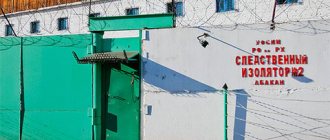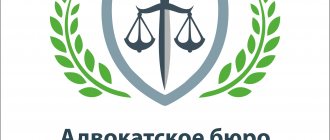Definition 1
A measure of procedural coercion is a procedural measure provided for by law that has an interim nature. They include preventive measures, as well as other measures of procedural coercion.
Preventive measures are applied only in relation to criminally prosecuted persons; other coercive measures can also be applied in relation to witnesses, victims and other participants in legal proceedings
Other measures of procedural coercion include:
- obligation to appear
- drive unit
- removal from office
- money penalty
- seizure of property
Coercive measures are used to ensure that participants in legal proceedings fulfill their legal obligations. For example, the obligations of a witness or victim to appear for questioning. Seizure of property can also be assigned to the criminally prosecuted person or to persons who, by law, are financially responsible for his activities. This, for example, includes the legal representatives of a minor suspect, accused, or defendant.
Are you an expert in this subject area? We invite you to become the author of the Directory Working Conditions
Definition 2
A preventive measure is a coercive measure that temporarily restricts the constitutional rights of a citizen, provided for by law and applied in a criminal case in the manner established by the Code of Criminal Procedure of the Russian Federation. We have already completed coursework
Criminal law. The general part is more detailed in relation to the criminally prosecuted person.
The concept of measures of procedural coercion and their classification
⇐ PreviousPage 19 of 61Next ⇒
Article 2 of the Constitution of the Russian Federation determines that a person, his rights and freedoms are the highest value. In Art. 22 of the Constitution directly states that everyone has the right to freedom and personal security. Along with this, both the Constitution of the Russian Federation and international acts indicate that such a right is not unlimited.
In cases where a person, for one reason or another, does not fulfill the duties assigned to him in accordance with the law, the state reserves the right to apply specially provided measures. Their action is aimed at preventing unlawful behavior of a person and ensuring the proper order of criminal proceedings. At the same time, the state, represented by the bodies and officials of criminal proceedings, ensures the proper procedure for applying these measures, and also monitors the observance of all rights, freedoms and legitimate interests of persons in respect of whom these measures were applied.
Measures of procedural coercion are measures of a preventive and suppressive nature enshrined in the current legislation, which are applied by specially authorized bodies and officials to certain participants in criminal proceedings in order to create an appropriate regime for criminal proceedings and prevent their unlawful behavior.
Measures of procedural coercion have the following characteristics.
1. Measures of procedural coercion are enshrined in current legislation.
This provision means that they include only those measures that are directly established in the Code of Criminal Procedure of the Russian Federation. In Part 1 of Art. 1 of the Code stipulates that the procedure for criminal proceedings is established by this Code, based on the Constitution of the Russian Federation. Therefore, the list of measures outlined in Section IV of the Code of Criminal Procedure of the Russian Federation should be considered exhaustive.
2. Measures of procedural coercion are applied only by specially authorized government bodies and officials.
These include the body of inquiry, the inquiry officer, the investigator and the court, acting within the limits of the powers granted to them. No other persons have the right to apply procedural coercion measures. In addition, the above bodies and officials do not have the right to entrust the application of procedural coercive measures to other persons, since this goes beyond the limits of their own competence, and especially the competence of other persons.
3. Measures of procedural coercion are applied only in accordance with the procedure established by law.
In accordance with this procedure, the use of coercive measures is possible only after the initiation of a criminal case. The decision to apply any of the procedural coercive measures available in the Code of Criminal Procedure of the Russian Federation is made in writing and must meet the requirements of legality, validity and motivation. In a number of cases, measures of procedural coercion, such as house arrest, detention, bail, temporary removal of a suspect or accused from office, etc., are applied by court decision. If the procedural procedure for applying a coercive measure is not observed, it is subject to immediate cancellation, regardless of how appropriate its use is.
4. Measures of procedural coercion are applied if there are appropriate grounds.
Such grounds are divided into two groups: 1) factual grounds, i.e. evidence contained in the materials of the criminal case that confirm the need to apply a certain measure of procedural coercion; 2) formal (legal) grounds, i.e. making an appropriate procedural decision and fixing it in a written document.
5. Measures of procedural coercion are subject to immediate cancellation in cases where the grounds for their use have disappeared.
This may occur in the following situations: a) the evidence that became the actual basis for applying a measure of procedural coercion was declared inadmissible; b) new evidence has been obtained that refutes the need to apply a measure of procedural coercion; c) the procedural procedure for applying a measure of procedural coercion was violated, and therefore the legal basis is recognized as inconsistent with the law.
The above provisions are important guarantees of the rights and freedoms of persons against whom procedural coercive measures are applied.
The importance of procedural coercive measures is that their use helps achieve the purpose of criminal proceedings, and also ensures the protection of the rights and legitimate interests of persons involved in criminal proceedings.
Classification of measures of procedural coercion is possible on various grounds. It is very relevant to divide them into the following groups: a) aimed at ensuring the proper behavior of participants in criminal proceedings; b) aimed at ensuring the process of proof; c) aimed at ensuring the execution of a sentence in relation to a civil claim and other property penalties.
The first group of measures of procedural coercion according to the Code of Criminal Procedure of the Russian Federation consists of: detention of a suspect (Chapter 12); preventive measures (chapter 13); obligation to appear (clause 1, part 1, article 111, article 112); drive (clause 2, part 1, article 111, article 113); monetary penalty (clause 3, part 2, article 111). The second group includes only one measure of procedural coercion - temporary removal from office (clause 3, part 1, article 111, article 114). The third group of procedural coercive measures also includes only the seizure of property (Clause 4, Part 1, Article 111, Articles 115-116, 118).
It should also be borne in mind that a number of procedural coercive measures aimed at ensuring the process of proof are included in the content of a number of investigative actions (for example, such as search, seizure, examination, etc.).
In the Code of Criminal Procedure of the Russian Federation, measures of procedural coercion are classified depending on the nature and intensity of the coercive influence that they have on the relevant participant in criminal proceedings. On this basis, they are classified into three groups: 1) detention of a suspect (Chapter 12 of the Code of Criminal Procedure of the Russian Federation); 2) preventive measures (Chapter 13 of the Code of Criminal Procedure of the Russian Federation); 3) other measures of procedural coercion (Chapter 14 of the Code of Criminal Procedure of the Russian Federation).
It should be borne in mind that these concepts correlate with the concept of “measures of procedural coercion” as philosophical categories of part and whole.
Suspect Detention
Detention of a suspect in accordance with paragraph 11 of Art. 5 of the Code of Criminal Procedure of the Russian Federation is a measure of procedural coercion, which is applied by the body of inquiry, the inquirer, the investigator for a period of no more than 48 hours from the moment of the actual detention of a person on suspicion of committing a crime. Actual detention in accordance with paragraph 15 of Art. 5 of the Code of Criminal Procedure of the Russian Federation begins from the moment of actual deprivation of freedom of movement of a person suspected of committing a crime.
The content of this measure of procedural coercion is the short-term isolation of a person and his placement in a specially equipped room in order to stop his further criminal actions, as well as to create appropriate conditions for collecting and verifying evidence confirming the involvement of this person in the commission of a crime. The coercive nature of detention is manifested in the fact that, against one’s will, one is deprived of freedom of movement.
The procedure for detaining a suspect is established in Chapter. 12 Code of Criminal Procedure of the Russian Federation. In any case, a person can be detained on suspicion of committing only a crime for which, in accordance with the Criminal Code of the Russian Federation, a sentence of imprisonment can be imposed.
To detain a suspect, the grounds established in Part 1 of Art. 91 Code of Criminal Procedure of the Russian Federation. These include the following cases: 1) when this person is caught committing a crime or immediately after its commission; 2) when victims or eyewitnesses point to this person as having committed a crime; 3) when obvious traces of a crime are found on this person or on his clothing, on him or in his home.
In Part 2 of Art. 91 of the Code of Criminal Procedure of the Russian Federation establishes the possibility of detaining a suspect in the presence of “other data”, which must also be recorded in the materials of the criminal case as evidence. However, even in this case, a person can be detained only if at least one of the additional conditions is met: a) if he tried to escape; b) if it does not have a permanent place of residence; c) if his identity has not been established; d) if the prosecutor, as well as the investigator or inquiry officer, with the consent of the prosecutor, sent a petition to the court to select a preventive measure in the form of detention in relation to the specified person. It should also be borne in mind that these conditions, in the absence of evidence confirming the need for detention, are not grounds for applying this measure of procedural coercion.
The procedural procedure for detaining a suspect is enshrined in Art. 92 of the Code of Criminal Procedure of the Russian Federation. It consists in the fact that after the person is brought to the body of inquiry or to the investigator, a report of detention is drawn up within no more than three hours. It indicates the date and time of drawing up the protocol, the date, time, place, grounds and motives for the detention of the suspect, the results of the personal search and other circumstances of his detention. In addition, a note is made in the arrest report that the suspect was explained his rights under Art. 46 of the Code of Criminal Procedure of the Russian Federation. The arrest report is signed by the person who compiled it, as well as by the suspect.
The fact that a suspect signs a protocol does not mean that he agrees with the arrest or the text of the protocol. Therefore, his statements and comments may be reflected in the arrest report. The suspect’s statements relate to the essence of the circumstances that led to the detention, and the comments relate to the content of the protocol.
The body of inquiry, the inquiry officer or the investigator is obliged to inform the prosecutor in writing about the detention within 12 hours from the moment of detention of the suspect. Having received the message, the prosecutor is obliged to check the legality and validity of the application of this measure of procedural coercion to a person and immediately release everyone illegally or unreasonably detained.
Furthermore, in accordance with Art. 96 of the Code of Criminal Procedure of the Russian Federation, no later than 12 hours from the moment of detention of the suspect, his close relatives must be notified, and in their absence, other relatives. The suspect may be given the opportunity to report his arrest himself (for example, by telephone). If the suspect is a military serviceman, then the command of the military unit is notified of his detention. When a citizen or national of another state is detained, the embassy or consulate of that state must be notified.
Notification may not be made only if it is necessary to keep the fact of the suspect’s detention secret in the interests of the preliminary investigation. A resolution on this is drawn up, which must be agreed upon with the prosecutor. However, if the suspect is a minor, then notification of his arrest occurs in any case.
The detained suspect in accordance with Part 2 of Art. 46 of the Code of Criminal Procedure of the Russian Federation must be interrogated no later than 24 hours from the moment of his actual detention. In this case, the suspect has the right to give explanations and testimony regarding the suspicion against him or to refuse to give explanations and testimony.
Before the start of the interrogation, the suspect, at his request, is provided with a private and confidential meeting with a defense lawyer. Only if it is necessary to carry out procedural actions with the participation of a suspect, the duration of a visit beyond two hours can be limited. Both the suspect and his defense attorney must be notified of this in advance.
When detained, the suspect may be subjected to a personal search in the manner prescribed by Art. 184 Code of Criminal Procedure of the Russian Federation.
A person detained on suspicion of committing a crime is held in specially equipped places in the manner established by Federal Law No. 103-FZ of July 15, 1995 “On the detention of suspects and accused of committing crimes.”
The detained suspect in accordance with Art. 94 of the Code of Criminal Procedure of the Russian Federation can be released in two cases: 1) when the period of detention has expired, and a preventive measure in the form of detention has not been chosen against the person; 2) when, before the expiration of the period of detention, the interrogating officer or investigator made a decision on his release due to the fact that: a) the suspicion of committing a crime was not confirmed; b) there are no grounds for applying a preventive measure in the form of detention; c) the detention was carried out in violation of the law.
When a suspect is released from custody, he must be issued a certificate indicating by whom he was detained, the date, time, place and reasons for detention, and the date, time and reasons for release. A person against whom this measure of procedural coercion was applied illegally or unreasonably, in accordance with Part 3 of Art. 133 of the Code of Criminal Procedure of the Russian Federation has the right to rehabilitation.
Preventive measure
Preventive measures are measures of coercive influence enshrined in the criminal procedural legislation against the accused (in exceptional cases, the suspect), which are used to ensure the appearance of a person when summoned, as well as to create appropriate conditions for preliminary investigation and trial in criminal cases.
The concept of preventive measures is closely related to the concept of procedural coercive measures. Being an integral part of a broader category, preventive measures have all the features inherent in measures of procedural coercion. However, they also have their own characteristics, which determine their inclusion in a separate chapter. 13 Code of Criminal Procedure of the Russian Federation.
1. Preventive measures are chosen in the presence of special grounds enshrined in Art. 97 Code of Criminal Procedure of the Russian Federation.
As with all measures of procedural coercion, the grounds for choosing preventive measures can be divided into factual and formal (legal). Factual grounds include evidence contained in the materials of the criminal case, which forms the internal conviction of the inquirer, investigator, prosecutor and the court that the person against whom one or another preventive measure will not be chosen will commit one of the following actions: a) will hide from inquiry, preliminary investigation or trial; b) may continue to engage in criminal activity; c) may threaten a witness, other participants in criminal proceedings, destroy evidence, or otherwise obstruct the proceedings in a criminal case; d) will prevent the execution of his sentence. In accordance with Art. 101 of the Code of Criminal Procedure of the Russian Federation, the formal (legal) basis for choosing a preventive measure is the decision of the inquirer, investigator, judge, and in cases where the preventive measure is chosen during the trial, a court ruling.
2. In addition to the grounds, when choosing a specific preventive measure, conditions must be taken into account, an approximate list of which is given in Art. 99 Code of Criminal Procedure of the Russian Federation.
These include: the severity of the charge, information about the identity of the accused, his age, state of health, marital status, occupation and other circumstances. These conditions do not replace the grounds for choosing a preventive measure enshrined in Art. 97 of the Code of Criminal Procedure of the Russian Federation, but only allow us to establish which preventive measure is appropriate to apply in each specific case.
3. Preventive measures are chosen by the inquirer, investigator, prosecutor, as well as the court within the limits of the powers granted to them.
Making decisions on the selection of preventive measures is the prerogative of the body or official in charge of the criminal case, or the court that exercises the function of judicial control at the stage of preliminary investigation. In addition, during the trial, the court of first instance has the right to elect, change or cancel a preventive measure against the defendant in the manner established by Art. 255 Code of Criminal Procedure of the Russian Federation.
4. As a general rule, preventive measures are taken against the accused.
In relation to the suspect in accordance with Art. 100 of the Code of Criminal Procedure of the Russian Federation, a preventive measure can be chosen only in exceptional cases, if there are grounds and taking into account the circumstances taken into account when choosing it. In this case, the suspect must be charged no later than
10 days from the moment of application of the preventive measure, and if the suspect was detained, and then, being in the position of a detained person, taken into custody - within 10 days from the moment of detention. If the person is not charged within this period, the preventive measure is subject to immediate cancellation.
These signs ensure the proper procedure for selecting and applying all preventive measures established by current legislation. In addition, each of the preventive measures has its own specific properties that characterize both its content and the procedure for selection.
Undertaking not to leave and proper behavior (Article 102 of the Code of Criminal Procedure of the Russian Federation) is that the suspect or accused gives a written undertaking: 1) not to leave his permanent or temporary place of residence without the permission of the investigator, interrogating officer or court; 2) to appear at the appointed time when summoned by the inquiry officer, investigator and to court; 3) not interfere with the criminal proceedings in any other way. The decision to select this preventive measure is enshrined in the resolution (definition - when the court makes a decision during the trial). A written undertaking not to leave is also issued, in which the person personally records the obligation undertaken.
A personal guarantee (Article 103 of the Code of Criminal Procedure of the Russian Federation) consists of a written undertaking by a trustworthy person that he guarantees that the suspect or accused will fulfill his obligations to appear within the appointed time when summoned by the inquirer, investigator, prosecutor and to the court, and otherwise not interfere with criminal proceedings. business. A personal guarantee as a preventive measure is allowed at the written request of one or more guarantors and with the consent of the person in respect of whom the guarantee is given. The following is explained to the surety: 1) the essence of the suspicion or accusation; 2) his duties and responsibilities (in particular, if the guarantor fails to fulfill his obligations, a monetary penalty in the amount of up to 100 minimum wages is imposed on him).
The election of this preventive measure is formalized by a resolution (definition). A written undertaking from the guarantor is also attached to the materials of the criminal case.
Supervision by the command of a military unit of a suspect or accused, who is a military serviceman or a citizen undergoing military training (Article 104 of the Code of Criminal Procedure of the Russian Federation), consists of taking measures provided for by the charters of the Armed Forces in order to ensure that this person fulfills his obligations to appear at the appointed time when called upon by the interrogating officer , the investigator and the court, and not otherwise interfere with the criminal proceedings. Such a person must be under constant supervision, he cannot be assigned to guard duty or other duties related to the carrying of weapons, and he cannot be released from the military unit. The election of this preventive measure is possible only with the consent of the suspect or accused.
The decision to select this preventive measure is sent to the command of the military unit with a simultaneous explanation of the substance of the suspicion or accusation, as well as the responsibilities of the command to monitor the serviceman (citizen undergoing military training). If a suspect or accused commits illegal actions, the command of a military unit immediately reports this to the authority that has chosen this measure of restraint.
Supervision of a minor suspect or accused (Article 105 of the Code of Criminal Procedure of the Russian Federation) consists of ensuring his proper behavior by parents, guardians, trustees or other trustworthy persons, as well as officials of the specialized children's institution in which he is located. Proper behavior in accordance with Art. 102 of the Code of Criminal Procedure of the Russian Federation is that a minor: 1) does not leave his permanent or temporary place of residence without the permission of the inquirer, investigator or court; 2) appears at the appointed time when summoned by the investigator, prosecutor and to court; 3) does not otherwise interfere with the criminal proceedings.
When choosing this preventive measure, the inquirer, investigator or court explains to the persons specified in Part 1 of Art. 105 of the Code of Criminal Procedure of the Russian Federation, the substance of the suspicion or accusation, as well as their responsibility related to the duties of supervision, about which these persons give a written undertaking. If these obligations are not fulfilled, persons may be subject to a monetary penalty of up to 100 minimum wages.
Thus, when choosing supervision of a minor suspect or accused as a preventive measure, a resolution on the selection of this preventive measure, as well as a written commitment of one or more persons listed in Part 1 of Art. 105 of the Code of Criminal Procedure of the Russian Federation.
Bail (Article 106 of the Code of Criminal Procedure of the Russian Federation) consists of the deposit of money, securities or valuables by the suspect or accused or other individual or legal entity into the deposit account of the body that has chosen this preventive measure in order to ensure the appearance of the suspect, accused before the inquirer, investigator or in court and preventing him from committing new crimes. The type and amount of bail are determined by the body or person who chose this measure of restraint. The criterion for this is the nature of the crime committed, information about the identity of the suspect, accused, as well as the property status of the pledgor.
This preventive measure is chosen in the same manner as the preventive measure in the form of detention, i.e., by a court decision, which is adopted on the basis of a petition of the investigator, agreed upon with the head of the investigative body, or a petition of the interrogating officer with the consent of the prosecutor.
If at the time of choosing this preventive measure a person is in custody or under house arrest, the initial preventive measure is applied until the deposit of the bail, which was determined by the body or person who elected this preventive measure, is deposited into the court's deposit account.
If the bail is paid not by the suspect (accused), but by another person, then the substance of the suspicion or accusation, as well as the obligations associated with posting the bail and the consequences of their failure or violation, are explained to the bailor. In particular, this person must be notified that in the event of failure or violation by the suspect (accused) of the obligations associated with the bail posted for him, the amount of the bail by court decision is converted into state revenue.
If the court has passed a verdict or dismissed the criminal case, then regardless of the type of verdict, the bail is returned to the pledgor. This also happens in cases where the criminal case was terminated by the prosecutor, investigator or investigator.
House arrest (Article 107 of the Code of Criminal Procedure of the Russian Federation) means that restrictions are imposed on the suspect or accused related to his freedom of movement, and a ban is imposed on communicating with certain persons, receiving and sending correspondence, and negotiating using any means of communication.
House arrest as a preventive measure is chosen if there are appropriate grounds in a manner that is identical to the procedure for taking into custody (Article 108 of the Code of Criminal Procedure of the Russian Federation). The decision to choose house arrest as a preventive measure is enshrined in a judge’s decision (at the pre-trial stages) or a court ruling (if this preventive measure was chosen during the judicial consideration of a criminal case). The decision must indicate the specific restrictions to which the suspect or accused is subject, as well as information about the official who is entrusted with monitoring compliance with these restrictions.
Detention (Article 108 of the Code of Criminal Procedure of the Russian Federation) is applied by a court decision in relation to a suspect or accused of committing crimes for which the criminal law provides for punishment in the form of imprisonment for a term of more than two years, if it is impossible to apply another, more lenient preventive measure. This preventive measure can be chosen in relation to a person suspected or accused of less serious crimes only in exceptional cases in the presence of one of the following circumstances: 1) the suspect or accused does not have a permanent place of residence in the territory of the Russian Federation; 2) his identity has not been established; 3) he violated a previously chosen preventive measure; 4) he hid from the preliminary investigation authorities or from the court.
The peculiarity of this preventive measure in relation to a minor suspect or accused is that it can be applied in cases of suspicion or accusation of such a person of committing a grave (with a sanction of up to 10 years of imprisonment) or especially grave (with a sanction of more than 10 years of imprisonment ) crimes. Only in exceptional cases can this preventive measure be chosen in relation to a minor who is suspected of committing a crime of average gravity, i.e. an intentional act, the punishment for which does not exceed five years of imprisonment, or a careless act, for which the maximum penalty exceeds two years in prison.
In Art. 108 of the Code of Criminal Procedure of the Russian Federation lays down a certain algorithm for choosing a preventive measure in the form of detention.
1. If there are appropriate grounds, the investigator, with the consent of the head of the investigative body, as well as the investigator, with the consent of the prosecutor, file a petition before the court. The decision to initiate a petition sets out the motives and grounds due to which it became necessary to take the suspect or accused into custody. It also substantiates the conclusion that it is impossible to choose a different, more lenient preventive measure against the person. The resolution must be accompanied by materials that confirm the validity of the requests. If a petition is filed against a suspect in respect of whom detention has been applied, then all materials are presented to the judge no later than eight hours before the expiration of the detention period.
2. The decision to initiate a petition and materials are considered by a judge of a district court or military court of the appropriate level. Consideration of a petition to select a preventive measure in the form of detention in relation to a suspect or accused is carried out in an open court session, except for cases expressly specified in the law (Part 2 of Article 241 of the Code of Criminal Procedure of the Russian Federation). The examination takes place at the place of the preliminary investigation or at the place of detention of the suspect. The review period is eight hours from the moment the materials are received by the court. The suspect or accused, the prosecutor, and also the defense attorney, if he is involved in a criminal case, take part in the court hearing. Also, the legal representative of a minor suspect or accused, an investigator, or an interrogating officer have the right to participate in a court hearing. All persons must be promptly notified of the time of the court hearing, but their failure to appear without a good reason does not prevent the consideration of the petition. The exception is when the accused fails to appear, since in his absence the issue of detention is not considered.
In accordance with Part 5 of Art. 108 of the Code of Criminal Procedure of the Russian Federation, a court decision to select a preventive measure in the form of detention in the absence of the accused is allowed only if the accused is put on the international wanted list.
3. At the beginning of the hearing, the judge announces which petition will be considered. He then explains the rights and responsibilities of the persons who appeared at the court hearing. The prosecutor or, on his behalf, the person who filed the petition, substantiates it. After this, other persons who appeared at the court hearing are heard.
Having considered the petition, the judge makes one of the following decisions: a) on choosing a preventive measure in the form of detention in relation to the suspect or accused; b) refusal to satisfy the application; c) to extend the period of detention for a period of no more than 72 hours at the request of one of the parties in order for it to provide additional evidence of the validity or unjustification of choosing a preventive measure in the form of detention.
A court decision to select a preventive measure in the form of detention can be made only if sufficient evidence confirms the grounds for its application and provides the parties with the opportunity to justify their position before the court, so that the court can resolve the issue of detention based on its own assessment of the circumstances criminal case, and not just on the arguments set out in the prosecution’s motion.
4. If a request to select a preventive measure in the form of detention in relation to a suspect or accused is refused, the judge, if there are appropriate grounds, has the right, on his own initiative, to choose a preventive measure in relation to the person in the form of bail or house arrest.
5. The judge’s decision is sent to the person who filed the petition, the prosecutor, as well as the suspect or accused. This resolution is subject to immediate execution.
6. The question of the court choosing this preventive measure can be raised again only in cases where new circumstances have arisen that justify the need to take a person into custody.
7. A judge’s decision to choose detention as a preventive measure may be appealed in cassation to a higher court within three days from the date of its adoption. The cassation court makes a decision on the complaint or decision no later than three days from the date of its receipt. The decision of the cassation court to cancel the judge's decision to choose detention as a preventive measure is subject to immediate execution.
The judge's decision to select a preventive measure in the form of detention in accordance with Art. 402 of the Code of Criminal Procedure of the Russian Federation can be appealed in a supervisory manner.
Since detention creates serious restrictions on a person’s freedom, the question of the timing of the application of this preventive measure is of particular importance. The periods of detention are established in Art. 109 Code of Criminal Procedure of the Russian Federation.
As a general rule, they cannot exceed two months. If it is impossible to complete the preliminary investigation within this period and in the absence of grounds for changing or canceling this preventive measure, this period may be extended by a district court judge to six months at the request of the investigator, submitted with the consent of the district prosecutor.
A further extension of the period to 12 months is carried out in relation to persons accused of committing grave or especially grave crimes, only in cases of complexity of the criminal case and if there are grounds for choosing this preventive measure. A decision on this is also made by the judge of the district court at the request of the investigator, submitted with the consent of the head of the relevant investigative body for the constituent entity of the Russian Federation.
From more than 12 to 18 months, the period of detention may be extended in relation to persons accused of committing especially serious crimes by a judge of a court of a constituent entity of the Russian Federation at the request of an investigator submitted with the consent in accordance with the jurisdiction of the Chairman of the Investigative Committee under the Prosecutor's Office of the Russian Federation or the head of the investigative body of the relevant federal executive body (under the relevant federal executive body).
No further extension of the period of detention is allowed, and the accused is subject to immediate release. The exception is cases when the investigator, in the manner established by Part 7 of Art. 109 of the Code of Criminal Procedure of the Russian Federation, filed a petition to extend the period of detention in order to familiarize the accused and his defense attorney with the materials of the criminal case.
The procedure for extending the period of detention during an inquiry has certain features. According to Part 4 of Art. 224 of the Code of Criminal Procedure of the Russian Federation, if it is impossible to complete the inquiry within 30 days and there are no grounds for changing or canceling the preventive measure in the form of detention, this period may be extended by a judge of a district court or a military court of the appropriate level in the manner established by Part 3 of Art. 108 of the Code of Criminal Procedure of the Russian Federation, at the request of the investigator with the consent of the district, city prosecutor or equivalent military prosecutor for a period of up to six months.
When calculating the period of detention, it should be taken into account that the following periods of time are also included in it: 1) the period of detention of a person as a suspect; 2) the period of stay under house arrest;
3) the period of forced stay in a medical or psychiatric hospital by a court decision; 4) the period during which the person was detained on the territory of a foreign state upon a request for legal assistance or for his extradition to the Russian Federation in accordance with Art. 460 Code of Criminal Procedure of the Russian Federation.
In Art. 110 of the Code of Criminal Procedure of the Russian Federation establishes the procedure for canceling or changing any of the preventive measures established by the Code. Thus, a preventive measure is canceled when it is no longer necessary. In addition, it can be changed to a more strict or softer one if the corresponding grounds enshrined in Art. 97 Code of Criminal Procedure of the Russian Federation.
The inquirer, investigator or judge makes a decision on canceling or changing the preventive measure, and the court makes a ruling. A preventive measure chosen during pre-trial proceedings by an investigator with the consent of the head of the investigative body or by an interrogating officer with the consent of the prosecutor can be canceled or changed only with the consent of these persons.
⇐ Previous19Next ⇒
Recommended pages:
Use the site search:
Grounds for applying coercive measures
An authorized person (investigator, court), within the limits of the rights granted to him by law, can choose a preventive measure for a criminally prosecuted person if there are grounds provided for by the Code of Criminal Procedure of the Russian Federation. In other words, if there is reason to believe that the person may:
- try to hide from the investigative authorities;
- continue to engage in illegal activities;
- threaten participants in the proceedings
- destroy evidence or otherwise interfere with the proceedings.
Finished works on a similar topic
Coursework Measures of coercion in criminal proceedings 470 ₽ Abstract Measures of coercion in criminal proceedings 280 ₽ Test work Measures of coercion in criminal proceedings 190 ₽
Receive completed work or specialist advice on your educational project Find out the cost
The use of a preventive measure is possible if, firstly, a criminal case has been initiated; secondly, a criminally prosecuted person has the status of a suspect, accused, defendant.
Only in court is it possible to apply a preventive measure related to restriction of freedom: bail, house arrest or detention. In pre-trial proceedings, such decisions are made by the court at the request of the investigator, which is submitted with the consent of the head of the investigative agency. Changes in such preventive measures are also carried out by the court. In addition, the court may choose any other preventive measure not related to restriction of freedom.
Legal deadlock in criminal proceedings
This is not the first time that the procedure for granting a person the status of a suspect when he is detained or when a preventive measure is chosen against him causes discussions in the professional community.
Traditionally, disputants fall into two main categories. The first argue that if the status of a suspect is assigned to a person when choosing a preventive measure (or detention in accordance with Articles 91, 92 of the Code of Criminal Procedure of the Russian Federation), then upon expiration of the period for filing charges under Part 1 of Art. 100 of the Code of Criminal Procedure of the Russian Federation, and the abolition of the preventive measure, criminal prosecution against this person must be terminated. Reason – the emergence of this status was due to the selection of a preventive measure (detention). The latter are confident that the status of a suspect and the preventive measure are concepts unrelated to each other. The last time the discussion arose on the pages of the Novaya Advocacy Gazeta, but among those who spoke out there were no supporters of the second approach yet.
My position on this issue is somewhat different from that already outlined by my colleagues, whose opinion I deeply respect.
In my opinion, the law has no legal uncertainty in this part. In Art. 27 of the Code of Criminal Procedure of the Russian Federation specifies an exhaustive list of grounds for termination of criminal prosecution, and the expiration of the period for filing charges established by Part 1 of Art. 100 of the Code of Criminal Procedure of the Russian Federation, is not included in this list. The Code of Criminal Procedure of the Russian Federation does not contain any indications that the criminal prosecution of a suspect should be terminated automatically upon the expiration of this period or that the investigator is obliged to change the status of the suspect to any other. The problem of law enforcement does exist here, but it lies in something else.
With “accusation” everything is more or less clear; this term is described in the law clearly and unambiguously: an accusation is a statement by the state that a certain person has committed a crime, put forward in a manner regulated by law (clause 22 of Article 5 of the Code of Criminal Procedure of the Russian Federation). In accordance with Part 1 of Art. 171 of the Code of Criminal Procedure of the Russian Federation, the investigator makes a decision to charge a person as an accused if there is sufficient evidence providing grounds for accusing the person of committing a crime.
In a situation with “suspicion” everything is much more complicated. Not only does the Code of Criminal Procedure of the Russian Federation do not define this term, it contains several contradictory norms that determine the moment from which a person becomes a suspect.
In Part 1 of Art. 46 of the Code of Criminal Procedure of the Russian Federation states that a suspect at the stage of preliminary investigation is a person against whom a criminal case has been initiated, or who has been detained in the manner prescribed by Art. 91 and 92 of the Code of Criminal Procedure of the Russian Federation, or to whom a preventive measure has been applied before charges are brought in accordance with Art. 100 Code of Criminal Procedure of the Russian Federation.
Let's try to analyze these norms in detail.
Granting the status of a suspect in the event of a criminal case being initiated against a specific person. In accordance with Part 4 of Art. 146 of the Code of Criminal Procedure of the Russian Federation, if a criminal case is initiated against a specific person, the investigator immediately notifies the suspect about this. The moment of initiation of a criminal case and the moment of the beginning of criminal prosecution in this situation are not separated in time; a person receives the status of a suspect when the proceedings begin, and from that moment he has the right to enjoy all the rights provided for in Art. 46 of the Code of Criminal Procedure of the Russian Federation. In this situation, I do not see any legal uncertainty leading to a possible violation of the rights of the suspect.
Detention of a person in accordance with Art. 91, 92 of the Code of Criminal Procedure of the Russian Federation or the application of a preventive measure to a person in accordance with Art. 100 of the Code of Criminal Procedure of the Russian Federation (clause 3, part 1, article 46 of the Code of Criminal Procedure of the Russian Federation). It is these norms that are the subject of disputes between lawyers. Part 1 art. 97 of the Code of Criminal Procedure of the Russian Federation determines that an investigator, inquiry officer or court, within the limits of their powers, has the right to choose for a suspect one of the preventive measures provided for by the Code of Criminal Procedure of the Russian Federation, if there are sufficient grounds to believe that he can hide from the investigation, inquiry or court, or may continue to engage in criminal activities, may threaten witnesses, other participants in criminal proceedings, destroy evidence, or otherwise obstruct the proceedings.
The law also determines in what cases an investigator or interrogating officer has the right to apply a measure of coercion to a person in the form of detention in accordance with Art. 91 and 92 of the Code of Criminal Procedure of the Russian Federation: a person is caught committing a crime; immediately after its commission, victims or witnesses pointed to this person as having committed the crime; obvious traces of a crime were found on this person or his clothing, on him or in his home. Coercive measures are also used to ensure proper criminal proceedings.
A preventive measure can be chosen only in relation to the accused in a criminal case, and in exceptional cases – in relation to the suspect, and then for a period of no more than 10 (and in strictly defined cases 45) days from the moment of its application or detention of the person.
Thus, we get a situation called deadlock. The law does not allow the selection of a preventive measure against a witness or his detention. However, a suspect is a person who has been detained or against whom such a measure has been taken. At what point does a witness become a suspect in this case?
In 2000, the Constitutional Court of the Russian Federation tried to sort out this situation. By Resolution No. 11-P of June 27, 2000, he declared the provision of Art. 47 of the Code of Criminal Procedure of the RSFSR, which granted a person suspected of committing a crime the right to use the assistance of a defense lawyer only from the moment the arrest report was announced to him or the decision to select a preventive measure in the form of detention. The court then found that some concepts (for example, “detention”), enshrined in the Code of Criminal Procedure of the RSFSR in their narrow sense, also have another – constitutional and legal meaning, which is that when carrying out accusatory activities against a person (search, identification , interrogation, etc.) or taking other measures taken to expose him or her or indicating the existence of suspicions against him, a person has the right to exercise his constitutional rights, including the right to receive legal assistance.
Analyzing this decision of the Constitutional Court of the Russian Federation, we can conclude that if a criminal case was initiated against unidentified persons, the person becomes a suspect at the moment of intensification of incriminating activities against him in the criminal case, which, however, does not eliminate the above deadlock.
To demonstrate a more clear example, consider the following situation. Let's assume that a criminal case has been initiated based on the fact. During the investigation, a suspect was identified, possibly involved in the crime. However, there are no sufficient legal grounds for detaining this person or applying a preventive measure against him. In practice, investigative authorities, checking a person for involvement, conduct searches, collect incriminating evidence, while the person is a witness with very limited rights. The witness does not have the right to familiarize himself with decisions on the appointment of examinations, expert opinions, and his lawyer is not vested with the rights of a defense attorney in a criminal case. The witness learns that the status has changed, as a rule, at the moment the detainment order is read out to him or a preventive measure is applied. On the other hand, a preventive measure can be chosen formally, in the absence of grounds for its selection, only in order to give a person the status of a suspect, since there are no other grounds for giving this status in the law. During the investigation of a criminal case, it is the testimony of the suspect that will be evidence in the criminal case, since the testimony of a witness given without the participation of a lawyer, in the event of further refusal, cannot have evidentiary value. The above significantly violates the constitutional rights of a person against whom criminal prosecution is actually carried out by the state without respecting the rights granted to him by the Constitution of the Russian Federation, or unreasonably limits his right to freedom by a formally chosen preventive measure.
Under such circumstances, it seems necessary to more precisely define the legislative procedure for granting the status of a suspect at the stage of preliminary investigation, as well as to give a legal definition of the term “suspicion” in its criminal procedural sense.
Notification of suspicion A special procedure for granting suspect status was introduced in 2007 only for the inquiry stage. So, in accordance with Art. 223.1 of the Code of Criminal Procedure of the Russian Federation, if a criminal case has been initiated based on the commission of a crime and during the investigation sufficient data has been obtained to suspect a person of committing a crime, the investigator draws up a written notification of suspicion of committing a crime, a copy of which is handed to the suspect. In addition to the necessary details and personal data, such a notification must contain a description of the crime indicating its place, time of commission and other circumstances to be proven in accordance with paragraphs 1 and 4 of Part 1 of Art. 73 Code of Criminal Procedure of the Russian Federation.
It would seem, why not introduce a similar procedure for the investigation stage? However, instead, in 2013, the legislator introduced Part 3 of Art. 49 of the Code of Criminal Procedure of the Russian Federation, paragraph 6, which in its current form determines that a defender (a person who protects the rights and interests of the accused and suspects) participates in a criminal case from the moment the procedural actions begin, affecting the rights and freedoms of the person in respect of whom the report is being verified about a crime in accordance with Art. 144 of the Code of Criminal Procedure of the Russian Federation (before the initiation of a criminal case), which introduces even more uncertainty - from what moment can a person become a suspect, and a lawyer - a defender.
In my opinion, there is no need to introduce an automatic change from the status of a suspect to the status of a witness if the 10-day (45-day) period for filing charges expires from the moment the preventive measure is chosen. Granting the status of a suspect is not related to the use of a preventive measure and has different purposes; this directly follows from the law. Moreover, this procedure cannot be considered as negative for the suspect. On the contrary, he receives a wider range of rights to carry out his defense than the witness has. There is no need to introduce an additional basis for terminating prosecution if the period for being brought as a suspect has expired. Moreover, the investigative authorities cannot be obliged to stop attempting to incriminate a possible suspect beyond the expiration of this period. To deprive a person of the rights that the status of a suspect gives him means to limit him in the implementation of special opportunities for legal protection.
How to eliminate contradictions? I believe that it would be more appropriate to regulate in detail the term “suspicion” as a statement about the presence of data giving grounds to suspect a person of committing a crime. The corresponding addition must be made to Art. 5 Code of Criminal Procedure of the Russian Federation.
In addition, I consider it advisable to supplement Ch. 22 art. 170.1 of the Code of Criminal Procedure of the Russian Federation similar to Art. 223.1 of the Code content, extending the procedure for granting the status of a suspect to the stage of preliminary investigation.
In conclusion, to eliminate the conflict of norms caused by the introduction of clause 6, part 3, art. 49 of the Code of Criminal Procedure of the Russian Federation, I believe it is necessary to introduce into the criminal procedural legislation (for example, in Part 1 of Article 49 of the Code of Criminal Procedure of the Russian Federation) the concept of “another person in respect of whom an inspection is carried out based on a report of a crime in accordance with Art. 144 of the Code of Criminal Procedure of the Russian Federation,” extending to such a person all the rights and guarantees that are provided to a suspect.








